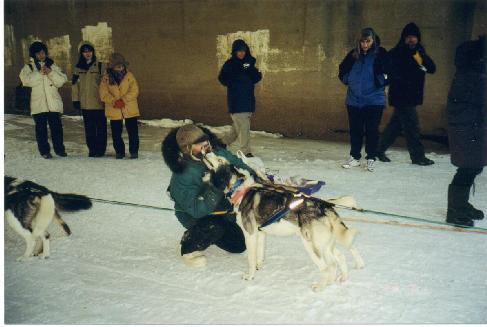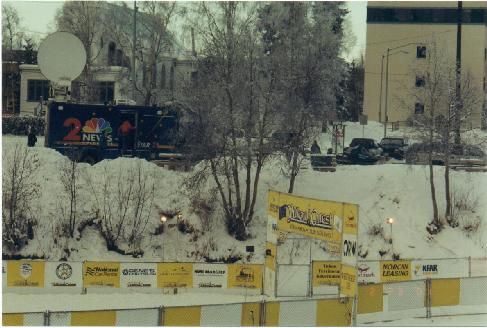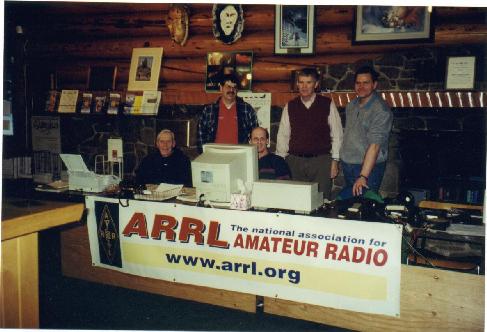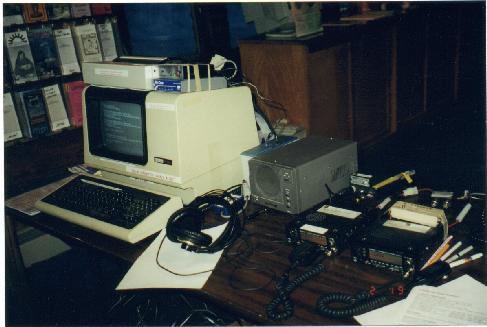Public Service Activity Report:
2001 Yukon Quest International Sled Dog Race
1. Nature of activity:
Special exercise
2. Brief description of activity:
Yukon Quest International Dog Sled race
3. Places or areas involved:
Whitehorse, Yukon Territory to Fairbanks, Alaska
4. Number of amateurs participating:
35
5. Event start date/time:
Feb 11, 2001
6. Event end date/time:
Feb 25, 2001
7. Duration of event:
336
8. Total man-hours:
1296
9. Number of repeaters used:
4
10. Estimated manpower cost (man-hours times $10/hr):
$12,960.00
11. Estimated cost of equipment used (hand-helds, repeaters, etc.):
$252,000.00
12. Total estimated cost of service (add amounts from lines 10 and 11):
$264,960.00
13. Nets and/or frequencies used (including repeater call signs):
KL7KC 146.88
146.79
146.70
146.82
Packet 145.01
14. Number of messages handled:
continuous
15. Names of agencies receiving communications support:
Yukon Quest Canada
Yukon Quest Alaska
Fairbanks Daily News Miner
Associated Press International
Channel 2 Anchorage
KUAC KFAR
16. Please list call signs of amateurs who were major participants:
WL7CRD WL7CRE WA4LKX AL0W WL7CPS KL7DW AL7P KL0BG KL1AW
KL0YU KL0QS KL7EBF KL1AJ AL1I KL0MG WL7UB AL7HT WL7TY AD4BL
KE4ITP KL7JM KL0RN WL7TP KL0CF KL7XO KL7EDK AL7EX AL7FQ NL7XH
NL7WO KL7YX AL7P WL7GK NL7F NL7HU
17. Other comments:
We manned the Communications Center 24/hr/day for the duration of the race. We used a packet
link from Dawson,City to Fairbanks for some of the data. We manned 5 checkpoints for 7 days
24/hr. We used VHF, HF, packet, email, and phone. We were responsible for manning the
Message Phone to answer questions from the public, families, school children, and various media.
We were also responsible for imputing the data on the teams on to the Yukon Quest International
Web page. We also assisted in helping vehicles and tourists who were stranded on top of Eagle
Summit in a white-out situation.
See the complete article attached to the end of this report.
Name of Amateur Radio organization providing service:
Arctic Amateur Radio Club
Location of organization:
Fairbanks Alaska
Your name and callsign:
Linda Mullen, AD4BL
Your address and telephone:
4555 Melan Dr N
Fairbanks, Alaska 99712
907-488-7046
ARRL appointment(s), if any:
Alaska Section Traffic Manager, ORS, OES, TS APRS
Your email address:
[email protected]
___________________________________________________________________________
YUKON QUEST INTERNATIONAL SLED DOG RACE
by Lina Mullen, AD4BL
The Yukon Quest International Sled Dog Race started on Feb 11,2001 in Whitehorse, CA. There were 30 teams
at the start line with 419 dogs straining to get on the trail.
The trail stretches from Whitehorse, Yukon Territory to Fairbanks, AK, 1023 miles over wilderness, rivers, peaks
rising to 3650ft, uphill and down, the route alternating its start every year.
The logistics of one of these events is staggering. There are race marshals, veterinarians,
checkers, checkpoint managers, air support, pickups for dropped dogs, trail breakers on snow machines, dog
handlers, communications, and a multitude of volunteers.
Mushers have to arrange for their supplies both for man and dogs to be shipped to the check points. Straw bails
are shipped to checkpoints for the dogs to bed in. Food is sent into the checkpoints to have for the influx of
mushers, race officials, vets, family members, team handlers, and media. Add to that the fact that this is an
International event which adds additional logistics.
This year the trail was the worst that they had seen in the history of the Yukon Quest, but we had really good
weather compared to what we have seen in past years. We didn't have severe cold and only one snow storm.
There was wind on top of Eagle Summit but there is always wind on Eagle Summit.
The Yukon Quest is more like old-time mushing. There are fewer checkpoints, longer distances between
checkpoints, you have to finish with the sled you started with, and it is a test of endurance and the relationship
between man and dog. It is more in the spirit of the North and the way folks traveled 100 years ago. Just to finish
the Quest is quite an achievement.
The Arctic Amateur Radio Club in Fairbanks had the primary communications responsibility. Weeks before the
race was to begin preparations were being made for equipment and operators. "Benny" Benevento NL7XH set
up the equipment and managed the amateur operation. The heart of the communications was a full amateur
station set up in the Fairbanks Visitor and Convention Center - the Log Cabin, which sits on the banks of the
Chena River in downtown Fairbanks. The Quest finish this year was on the Chena River in front of the Log
Cabin. The folks at the Visitor's Center gave us full access to the Center 24 hrs a day for 2-3 weeks.
This year we set up a packet link on VHF which used 5 digi's and zigzagged from high point to high point
between Fairbanks and Dawson City, Yukon which is a distance of 500 miles. Benny also set up an HF to VHF
voice link. The HF was at his home and the
VHF was carried via 220 to the dual band VHF in the Log Cabin. We also used HF between some of the
check-points near the Canadian Border and we used 2 repeaters on VHF. Since one of the repeaters is the
main repeater for Fairbanks, the normal daily use by amateurs was somewhat curtailed.
We received reports from the Canadian checkpoints via fax and phone but once the teams reached Dawson
City, we were able to use amateur radio to receive all the reports. There are 6 check points in Canada and 7 in
Alaska.
The Yukon Quest was part of a set of 3 races. The Jr Yukon Quest started the day before the Quest began. It is a
race for 14 to 18 year old mushers. We had 10 teams. That race ran out of Fairbanks 60 miles and back in the
next day. We had full amateur coverage on that race with 15 amateurs stationed at check points and control
center. We used 2 repeaters on VHF to log all the check-in times and track the mushers. We also had an
amateur on snow-machine on the trail for both days. Our primary concern was safety for the youngsters
because of open water and wildlife concerns. The race was won by a 14 year old.
After the main Yukon Quest got started, they started the Yukon Quest 250 out of Whitehorse. It is a qualifying
race to participate in the Yukon Quest and the Iditarod. Our duties on this one were to log all the reports and fax
them to Quest Canada, Quest Alaska, and the Fairbanks Daily News Miner.
The Yukon Quest Communications Center was manned from the beginning of the Jr Quest Feb 10 to the end of
the Quest on Feb 26, 24 hours a day. The operators were responsible for manning the packet, HF, 2 VHF
radios, UHF simplex link to the River,
Fax, 2 phone lines, and the web site. We always had 2 operators on site but when things got busy it was hard to
manage all the duties. Canada has the web-site, YukonQuest.org but we were tasked with entering all the data
as it came in. This web-site was used by folks all over the world. It was important that we only entered data that
was "official", so sometimes we would hear things about the race but couldn't add the data so there were times
when the data entering was delayed.
One of the tasks we had in the Communication Center was to answer the Message Phone. We received calls
from folks all over. The fun calls were from the school children. They had classroom projects on the Quest and
the children were assigned a musher to follow. They would call the Center to ask about "their" mushers location
and how they were doing. Some would call and want to know where a team was and we would answer that the
team was out of the checkpoint and on the way to the next, and then we were asked where they were right now.
We have become an instant society used to our quick media coverage and what they didn't realize was that the
team was out in the wilderness and there was no way we could know exactly where it was. As the race went on
we received anxious calls from families in Canada and the lower 48 trying to get information on their family
member on the trail.
The ARRC manned 8 check-point locations. Seven of the locations required the team to be on location for a
week. Some of them stayed in the check-point facilities which usually meant a sleeping bag on the floor, but for
two of the check-points we had mobile
homes that were towed to the location. The check-point operators suffered from the cold and lack of sleep and
had their own adventures getting to and from the check-point locations.
We had a total of 35 amateurs working the Yukon Quest this year including Doug Burke, WA4LKX, who comes
up from Richmond, VA every year to help.
One night towards the end of the race, there was a call from the check-point at mile 101 saying that there were a
tour bus, a truck, and an 18 wheeler stuck on top of Eagle summit. It is at 3650ft and the winds there had created
white-out blizzard conditions. Some of the passengers in the bus were brought down from the summit to the
check-point by a truck that had been heading up to the summit. Our communications was able to arrange
assistance through DOT and the Alaska Troupers for the folks who were stranded. We had an amateur team
coming in from a closed check-point over Eagle summit and they made it by watching for the concrete posts
along the edge of the road even though it was white out conditions. We still had dog teams who had to cross
the summit.
This was a hard race. One musher coming into a checkpoint reached for what he thought was water and
swallowed methyl alcohol instead. It is used as a fuel to fire the stove that cooks the dog food. He had to be
airlifted to Whitehorse and then Fairbanks but eventually made a full recovery. One of the mushers came down
with pneumonia and had to scratch. Another musher suffered a severe eye infection and the Quest officials
brought medicine to the check-point for him. When you have people and dogs who are used to their own areas
come into contact with each other, disease spreads rapidly both among the mushers and dogs.
One musher had a dog, which was riding in the sled basket, and when he stopped to do something with the
team, the dog jumped out and took off. He had to retrieve the dog before he could go on the next check-point. He
did find it. We eventually had 11 teams scratch and one team was disqualified. There were 19 teams that
crossed the finish line.
The last team in had some problems, he endured -40 temps, froze his feet and hands, and had problems with
his sled runners. He received the traditional Red Lantern award for the last team in.
Our amateur teams worked hard and provided assistance beyond normal communications duties. This is a
major event for the club and they did an outstanding job.

#1 (TURNER.JPG) Frank Turner hugs his dogs just after he crossed the finish line.
He also received the Vets's Coice Award for the care he gave to his
dogs on the race.

#2 (TURNER2.JPG) Frank Turner's team at the finish line while the officials check
the sled equipment.

#3 (FINISH.JPG) Finish line on the Chena River in Fairbanks and the Channel 2 truck
that traveled the whole race.

#4 (VISIT2.JPG) Convention and Visitor's Center in Fairbanks Alaska

#5 (KENT1.JPG) Kent Petty KL5T, Section Manager of Alaska confers with Jim Movius
KL7JM about the packet that would be used out of Dawson City

#6 (KENT2.JPG) Net control operators, Bill Mullen KE4ITP, Greg Eshright KL0QS,
Billy Connor AL7FQ, Jim Movius KL7JM, Kent Petty KL5T Section Manager
Alaska.

#7 (NC.JPG) Net Control operators Bill Mullen KE4ITP, Bob Clark KL7EBF, and
Bob Kreiser WL7GK

#8 (EQUIPMET.JPG) Some of the equipment that was used at Net Control

#9 (WEBCHCK.JPG) Webcheck Bill Mullen KE4ITP, Cliff Cullings AL7P, Greg Eshright
KL0QS
kl0qw
Last modified: Wed Apr 4 16:46:06 AKDT 2001